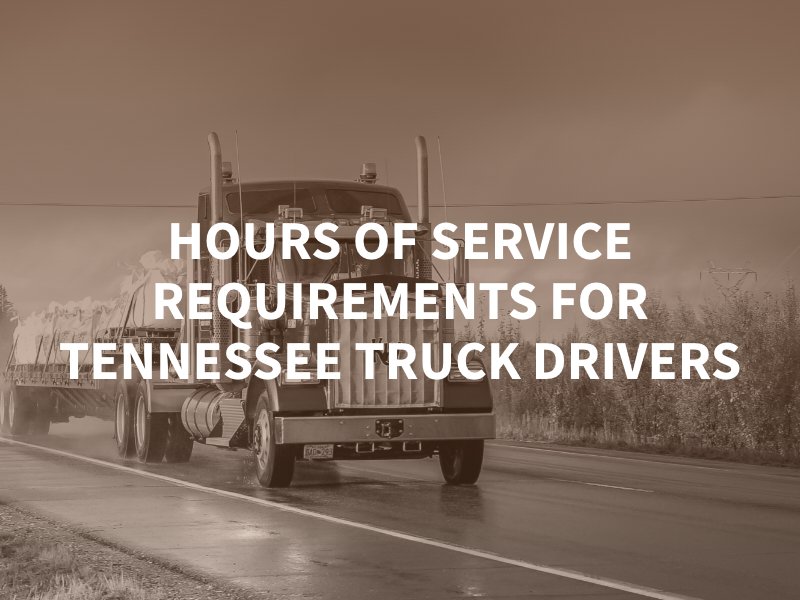Tennessee Truck Driver Laws & Regulations
Posted in Truck Accidents on July 20, 2023
Drivers who operate or own commercial trucks understand that there are significant federal and state regulations they must adhere to. In most cases, states follow the regulations set forth at the federal level, but there are a few laws specific to Tennessee that truck drivers and owner-operators need to be aware of. It is crucial for commercial vehicle operators and others to understand these laws and how they affect safety on roadways throughout the state. Failure to adhere to state and federal regulations could lead to liability issues should an accident occur on Tennessee roadways.

Some General Federal Regulations
Federal regulations are imperative when it comes to the safe operation of larger commercial trucks across the country. Even though each state does have separate regulations related to the trucking industry, the federal government tends to have the most authority over these vehicles. However, federal authority only extends to commercial trucks that cross state lines. Even though this is the majority of commercial trucks in the state, there are many that also operate solely within Tennessee.
Some of the main federal regulations related to truck drivers and truck companies revolve around hours of service requirements, log books, and regular maintenance and inspection.

Hours of Service
Truck drivers that operate across state lines must abide by the hours of service requirements applied by the Federal Motor Carrier Safety Administration (FMCSA). In general, the following regulations apply to most truck drivers:
- 11 total hours of driving time after 10 consecutive hours off duty
- 14-hour limit for on-duty time during the day. Drivers must not operate beyond the 14th consecutive hour after coming on duty following 10 hours off.
- 30-minute breaks are required when drivers have driven a cumulative period of eight hours without one 30-minute interruption. This break can be satisfied with various non-driving activities that occur in a consecutive 30-minute time frame.
- There is a 60 or 70-hour limit depending on the time frame involved. Drivers may not operate beyond 60 hours in a seven-day work week or beyond 70 hours in an eight-day work week. Drivers can restart a seven or eight-day period after taking 34 or more consecutive hours off duty.
Logbooks
Federal law requires that all commercial trucks come equipped with an electronic logging device (ELD). Previously, these were paper logs, and drivers put in a log of their hours and hauls with their own handwriting and timestamps. Now, these logs are electronic and plugged into large commercial trucks.
Electronic logging devices automatically record a driver’s hours of service as well as information related to the vehicle’s engine, miles driven, and overall movement.
Maintenance Logs
The FMCSA also puts forth requirements for truck companies and truck owner-operators. Federal regulations state that every motor carrier is required to regularly “inspect, repair, and maintain…all motor vehicles subject to its control.”
This includes ensuring that all parts and accessories are in safe and proper working conditions, and regulations state that commercial motor vehicles cannot be operated in a condition that is likely to lead to an accident or breakdown of the vehicle.
Tennessee Specific Laws
In addition to the federal laws that govern commercial trucks that operate in Tennessee, this state also has specific laws that truck drivers must adhere to. These laws apply to drivers who operate from state to state as well as drivers who operate solely within the boundaries of Tennessee:
- Tennessee Code Annotated § 55-8-1301: This law prohibits truck drivers from operating the vehicle while under the influence of alcohol or drugs. Violators can be fined up to $1,000 and/or imprisoned for up to 11 months and 29 days.
- Tennessee Code Annotated § 55-8-1302: This law prohibits truck drivers from driving while fatigued. Drivers are required to take a 30-minute break for every 8 hours of driving. Violators can be fined up to $500 and/or imprisoned for up to 30 days.
- Tennessee Code Annotated § 55-8-1303: This law prohibits truck drivers from using a cell phone while driving. Drivers are only allowed to use hands-free devices. Violators can be fined up to $250.
- Tennessee Code Annotated § 55-7-203(b)(3): This law states that no commercial vehicle in this state can weigh more than 80,000 pounds. Violation of this statute could lead to a Class C misdemeanor conviction. Additionally, the law states that trucks must be no wider than 8 feet and no taller than 13 feet 6 inches.
- Tennessee Code Annotated § 55-50-403: This law regulates the issuance of commercial driver’s licenses in Tennessee. State law requires that employers ensure that every employee who operates a commercial truck has their current CDL. Additionally, truckers must provide a valid medical card that states they are medically fit to operate a commercial truck.
These are only a few state-specific laws related to the commercial trucking industry in Tennessee. If you have any questions about a particular claim or regulation, we encourage you to reach out to your employer or state or federal agencies responsible for truck regulation.
Speaking With an Attorney
If you or somebody you care about has been injured in a truck crash caused by the actions of a truck driver or a trucking company, we encourage you to reach out to an attorney as soon as possible. Truck drivers and trucking carriers are extensively regulated, but that does not mean it will be easy to recover compensation should an accident occur.
When you have a skilled Nashville, Tennessee truck accident attorney on your side, you will have an advocate ready to conduct a complete investigation into the incident. This includes examining truck driver and company records for adherence to state and federal regulations. Violation of government regulations could help prove liability for an accident. Additionally, your attorney will conduct an investigation of the actual accident scene and evidence gathered at the time the incident occurred. The goal is to help truck accident victims recover compensation for their medical expenses, lost income, pain and suffering damages, property damage expenses, and more.




